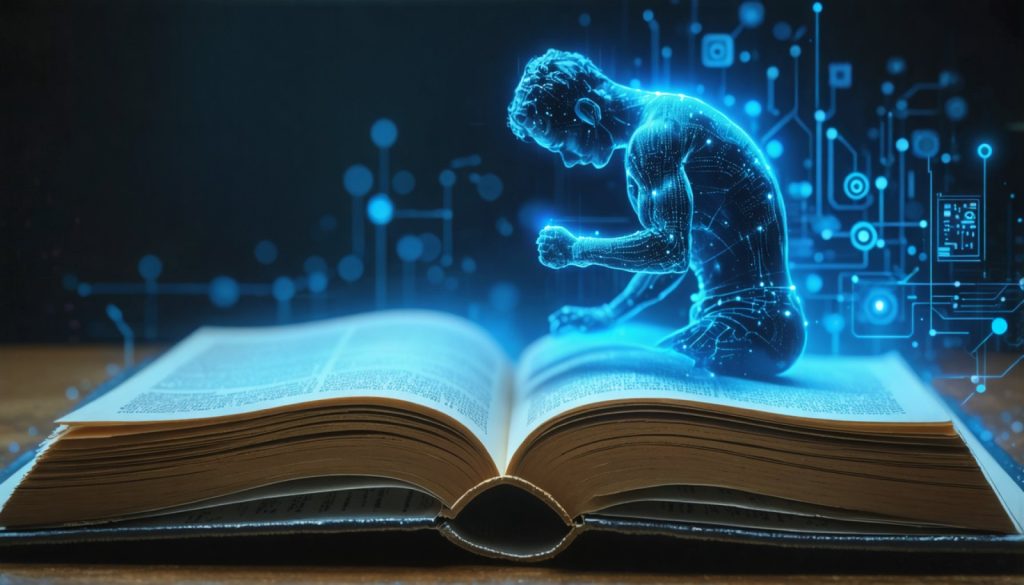
- Dwai Banerjee explores the intersection of technology and society, focusing on the human experience beyond academic discourse.
- In Enduring Cancer, Banerjee examines the emotional struggles of disadvantaged cancer patients in Delhi, emphasizing the need for holistic care.
- His work, Hematologies, co-authored with Jacob Copeman, delves into the cultural symbolism of blood in Indian society.
- Banerjee’s upcoming book chronicles India’s computing history, reflecting on its post-independence technological ambitions and outcomes.
- His interdisciplinary approach combines anthropology, history, and technology, advocating for a deeper understanding of the human elements in technological progress.
- Banerjee’s career, marked by a pivot from computer engineering to cultural anthropology, highlights the importance of personal narratives in societal contexts.
- Amid rapid innovation, Banerjee urges not to overlook the people driving technological change.
Peering through the kaleidoscope of human experience, Dwai Banerjee embarks on a journey to unearth the intersections between technology and society, offering unique insights that resonate beyond the confines of academic discourse. As an associate professor at MIT’s Program in Science, Technology, and Society, Banerjee’s explorations traverse the realms of medicine, culture, and innovation, yet are anchored by a singular focus: humanity.
His 2020 tome, Enduring Cancer, peers into the lives of economically disadvantaged cancer patients in Delhi. Within its pages, a lesser-told story emerges, one that captures the psychological turmoil overshadowing the physical affliction. Banerjee deftly paints a portrait of individuals spun in a web of uncertainty, adrift from their former selves, navigating a medical landscape that evolves to prioritize not just survival, but dignity.
At the heart of this work lies a poignant message: technologies that heal the body must also solace the soul. As cancer patients grapple with a harrowing diagnosis, Banerjee reveals their inner dialogues, exposing the inadequacies of a system unprepared for their profound emotional needs. It’s a vivid reminder that the fruits of technology are often bittersweet.
Banerjee’s scholarly pursuit expands through Hematologies, co-authored with Jacob Copeman, which delves into symbolic interpretations of blood in Indian society. This exploration underscores the intricate tapestry of beliefs and practices interwoven with cultural identity, challenging readers to reconsider how such enduring themes shape contemporary thought.
Anticipation builds as Banerjee prepares to unveil his latest work chronicling the history of computing in India. Recalling an era when India aimed to carve its niche in the technological arena post-independence, he retraces a trajectory marked by ambition and eventual capitulation to global corporate forces. The narrative invites reflection on the country’s transition from a potential technological sovereignty to its present role within the global tech landscape, spurred by globalization’s relentless march.
Banerjee’s explorations remind us: history is not a static backdrop but a dynamic force molding our interactions with technology. As he traverses the annals of the past, he raises questions about autonomy, identity, and the ramifications of a globalized market, each resonating with today’s digital citizens.
His work is anchored in the humanities—a domain he embraced fervently after initially pursuing computer engineering. This pivot ignited a passion for understanding the human condition, echoing through his tenure at institutions like the Delhi School of Economics and New York University. Through his studies in cultural anthropology, Banerjee has mastered the art of weaving personal narratives into broader societal tapestries.
With MIT granting him tenure last year, Banerjee continues to blend anthropology, history, and technology, sparking conversations ripe with nuance and implication. His vocation is a clarion call: to tread the interdisciplinary path is to remain open to the vast and unpredictable nature of human interaction with technology.
As these threads intertwine, Banerjee’s work encapsulates a central tenet—a commitment to understanding and illuminating the human elements within technological progress. In a world where innovation races ahead, his message is timeless: never forget the people shaping the pulse of change.
Unlocking the Human Element in Technological Progress
Exploring Intersections of Technology, Society, and Humanity
Dwai Banerjee brings a unique perspective to the crossroads of technology and society, digging deep into the nuances that make technological advancements more than just a series of breakthroughs; he highlights the profound impact on human lives. Banerjee, an associate professor at MIT’s Program in Science, Technology, and Society, explores the realms of medicine, culture, and innovation, focusing keenly on humanity’s enduring spirit amidst these rapid changes.
His insightful book, Enduring Cancer, sheds light on the lives of economically disadvantaged cancer patients in Delhi, portraying the psychological struggles that often overshadow their physical ailments. Banerjee emphasizes the complex emotional landscape that the healthcare system often overlooks, advocating for a more compassionate approach that addresses both survival and dignity.
Real-World Use Cases and Insights
How-to Steps for Holistic Healthcare:
1. Integrate Emotional Support: Ensure that psychological care is as prioritized as physical treatment, incorporating counseling and support groups into standard cancer care.
2. Cultural Sensitivity: Understand and respect cultural beliefs that might influence patients’ perceptions of illness and treatment, creating a more patient-centered approach.
3. Community Engagement: Leverage community resources to support patients, involving local groups to provide both emotional and logistical support.
Exploring Symbolism and Cultural Nuances
In Hematologies, co-authored with Jacob Copeman, Banerjee investigates the symbolic interpretations of blood within Indian society. This exploration addresses how deeply rooted cultural beliefs influence contemporary thinking, revealing the intricate tapestry that weaves together tradition and modernity.
Upcoming Works and Industry Trends
Banerjee is set to release a new work chronicling the history of computing in India. His study recalls an era of technological ambition post-independence as India sought a sovereign technological identity before the onset of globalization. This narrative provides important context for understanding the shifts and trends in India’s current tech landscape amid global pressures.
Market Forecasts and Predictions
– Growth of Digital Sovereignty in Emerging Markets: As countries like India continue to evolve in the global tech space, expect more nations to seek autonomy and local innovation, balancing international collaborations with domestic advancements.
– Focus on Human-Centric Technology: With technology increasingly defining modern life, future innovations will likely center around more human-focused applications, addressing not only technical but also emotional and social needs.
Conclusion: Actionable Recommendations
– Embrace Interdisciplinary Approaches: Cross-disciplinary studies can provide comprehensive insights into the impact of technology on human experiences. Engage with fields such as anthropology and history to enrich technological developments with cultural context.
– Foster Global Conversations: Platforms cultivating global discourse on technology and humanity, much like Banerjee’s work, should be encouraged to develop technology policies that consider diverse perspectives.
For further exploration of Dwai Banerjee’s interdisciplinary work and its implications on technology and society, visit the MIT and New York University websites.
Whether you are a student of technology, a cultural anthropologist, or a policy maker, Banerjee’s work imparts a timeless message—technology must always be shaped with an eye on the humanity it serves. Embrace the intersections of culture, history, and technology to create innovations that are not only groundbreaking but also deeply humane.



